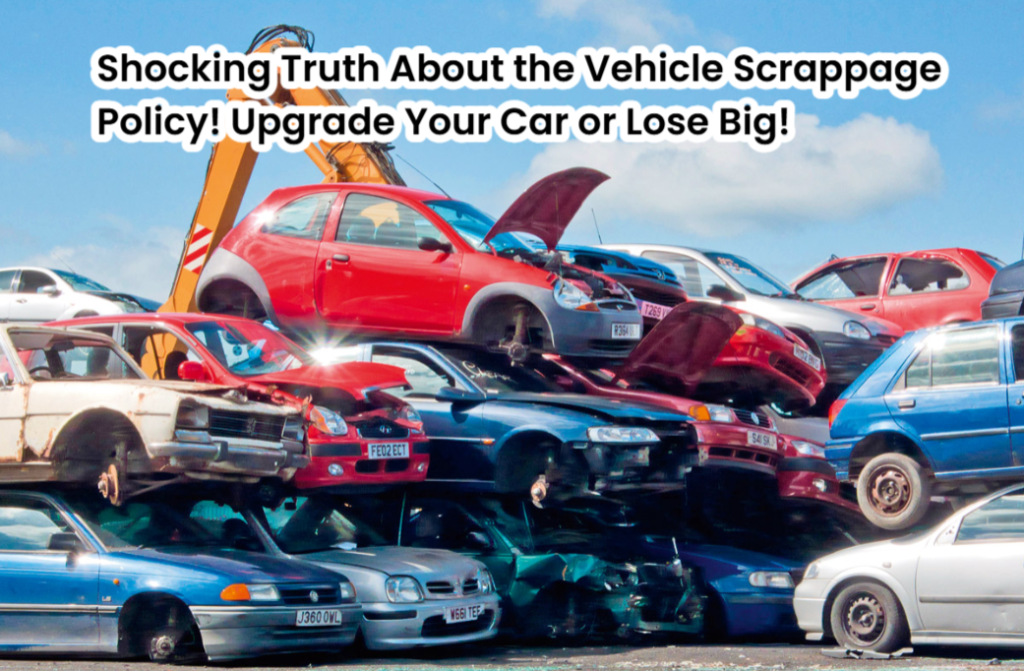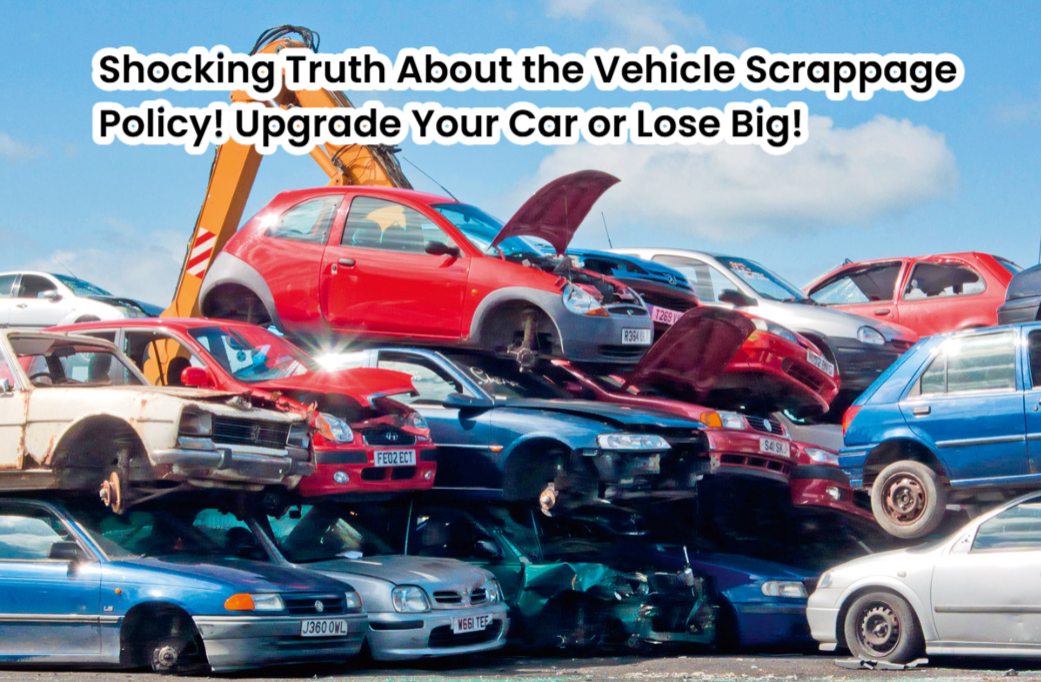Indians often develop an emotional attachment to their vehicles, keeping them for years beyond their prime. These vehicles can be special to us, but using them for a long time can hurt the environment. It leads to more carbon emissions and pollution. To address this issue, the Indian government introduced the Vehicle Scrappage Policy in the Union Budget of 2025. This policy wants to cut pollution. It will phase out old, unfit vehicles. It also encourages using newer, cleaner, and fuel-efficient models.
In this blog, we will dive into the Vehicle Scrappage Policy. We’ll cover its goals, categories, benefits, and how to scrap vehicles.

What is the Vehicle Scrappage Policy?
The Vehicle Scrappage Policy is a plan by the Government of India. It aims to remove old and unfit vehicles in an organized way. The policy sets up a clear plan to remove old, polluting cars and replace them with eco-friendly options. Vehicles will be checked at automated testing stations. Then, they will be processed at government-approved scrapping facilities nationwide.
Key Features of the Vehicle Scrappage Policy
- Mandatory Fitness Test:
- Private vehicles over 20 years old must pass a fitness test.
- Commercial and government vehicles over 15 years old also need this test to check roadworthiness.
- De-registration of Unfit Vehicles: If a vehicle fails the fitness test, it will be deregistered and sent for scrapping.
- Incentives for Scrapping Old Vehicles: Vehicle owners can earn cash, get tax breaks, and enjoy discounts by scrapping their old cars.
- Green Tax Implementation: Owners of older vehicles will need to pay a green tax if they continue to operate them after failing the fitness test.
- Encouraging Cleaner Vehicles: This policy will boost the demand for electric vehicles (EVs) and cleaner fuels.
Categories of Vehicles Under the Scrappage Policy
The government has divided vehicles into different categories based on ownership and purpose of use:
1. Government Vehicles
- Vehicles owned by central and state governments will be scrapped if they exceed 15 years of age.
- These vehicles will not be allowed to undergo a fitness test or re-registration.
- The scrapping process for government vehicles is expected to begin from April 1, 2025.
2. Commercial Vehicles
- All commercial vehicles must undergo a fitness test after completing 15 years.
- If a commercial vehicle fails the fitness test, it will be deregistered and scrapped.
- If it passes the test, it will be eligible for re-registration for five more years.
- However, if the vehicle owner does not opt for the fitness test, the vehicle will automatically be scrapped.
3. Private Vehicles
- Private cars and two-wheelers older than 20 years must pass a fitness test to continue running on the road.
- If the vehicle fails the test, it will be deregistered and scrapped.
- If it passes, it can be re-registered for five more years.
4. Vintage Vehicles
- Vintage and classic vehicles (older than 50 years) are exempt from the scrappage policy.
- These vehicles must, however, comply with specific preservation and registration requirements.
Benefits of the Vehicle Scrappage Policy
The scrappage policy brings several economic and environmental benefits. Here are some of the most significant ones:
1. Environmental Benefits
- Older vehicles contribute significantly to air pollution due to higher emissions.
- The policy seeks to eliminate old vehicles. It also supports cleaner transport choices, such as electric vehicles (EVs) and BS-VI fuel-compliant models.
- Getting rid of older vehicles will greatly cut carbon emissions. This will improve air quality in cities.
2. Financial Benefits for Vehicle Owners
- Vehicle owners will receive a scrap value equivalent to 4-6% of the ex-showroom price of a new vehicle when they opt for scrappage.
- When owners show a vehicle scrapping certificate while buying a new vehicle, they get a discount on registration fees.
- Owners can also avail of motor vehicle tax concessions—up to 25% for private vehicles and 15% for commercial vehicles.
- Some car makers may give a 5% discount to customers with a vehicle scrappage certificate.
3. Boost to the Automobile Industry
- Scrapping old vehicles will increase the demand for new vehicles, boosting automobile sales.
- The policy will also promote local manufacturing, supporting the Make in India initiative.
- The recycling industry will gain from reusing scrap materials like steel, plastic, and rubber to make new vehicles.
4. Job Creation and Economic Growth
- The scrappage ecosystem will open new business chances. This includes vehicle testing centers, dismantling centers, and recycling units.
- The policy is expected to generate thousands of new jobs in the automobile and recycling industries.
Vehicle Scrappage Process: How It Works
If you have an old vehicle and want to scrap it under this policy, here’s the step-by-step process:
Step 1: Vehicle Fitness Test
- Visit a government-approved Automated Fitness Testing Center.
- Your vehicle will be checked for:
- Roadworthiness
- Emission levels
- Safety features
- Overall condition
- If it passes, you can continue using it. If it fails, the vehicle must be scrapped.
Step 2: De-Registration of Vehicle
- The vehicle will be deregistered by the Regional Transport Office (RTO).
- The deregistered vehicle cannot be legally used on the road.
Step 3: Scrapping of Vehicle
- The vehicle will be sent to a registered vehicle scrappage facility.
- It will be dismantled, and reusable materials will be recovered.
- The owner will receive a Vehicle Scrappage Certificate.
Step 4: Availing Benefits for a New Vehicle
- You can use the scrappage certificate to get benefits like discounts on new vehicles, tax waivers, and lower registration fees.
Must read:
- Unlock the Ultimate Admin-Agent Synergy: Revolutionizing Insurance Operations for Maximum Success!
- Warning: These 5 Home Renovations Could Skyrocket or Slash Your Insurance Costs!
- BYOD Nightmare: The Hidden Risks That Could Destroy Your Business Without a Formal Policy!
FAQs on the Vehicle Scrappage Policy
u003cstrongu003eWhy was the vehicle scrappage policy introduced?u003c/strongu003e
The policy aimed to cut pollution. It also promoted safer, fuel-efficient vehicles. Additionally, it supported the auto industry and helped create jobs.
u003cstrongu003eWhen will the policy come into effect?u003c/strongu003e
For u003cstrongu003ecommercial vehicles (15+ years old)u003c/strongu003e: u003cstrongu003eApril 1, 2025u003c/strongu003eu003cbru003eFor u003cstrongu003eprivate vehicles (20+ years old)u003c/strongu003e: u003cstrongu003eJune 1, 2025u003c/strongu003e
u003cstrongu003eWhat happens if my vehicle fails the fitness test?u003c/strongu003e
If a vehicle u003cstrongu003efails the fitness testu003c/strongu003e, it will be u003cstrongu003ederegisteredu003c/strongu003e and u003cstrongu003emust be scrappedu003c/strongu003e at a registered facility.
u003cstrongu003eCan I still use my vehicle if it passes the fitness test?u003c/strongu003e
Yes, if your vehicle passes the test, it can be u003cstrongu003ere-registered for five yearsu003c/strongu003e.
u003cstrongu003eWhat benefits do I get for scrapping my old vehicle?u003c/strongu003e
You will get a scrap value of 4-6% of the ex-showroom price. Also, you will enjoy tax waivers, registration fee exemptions, and discounts on buying new vehicles.
Conclusion
The Vehicle Scrappage Policy is a game-changer for India’s automobile and environmental sectors. The policy will encourage vehicle owners to swap old cars for new, eco-friendly ones. This will cut down pollution, increase road safety, and promote economic growth. If you own a vehicle that is 15-20 years old, it may be time to consider scrapping it and upgrading to a cleaner, more efficient alternative.
For more details, check with your Regional Transport Office (RTO). You can also visit an authorized vehicle scrappage center today!
